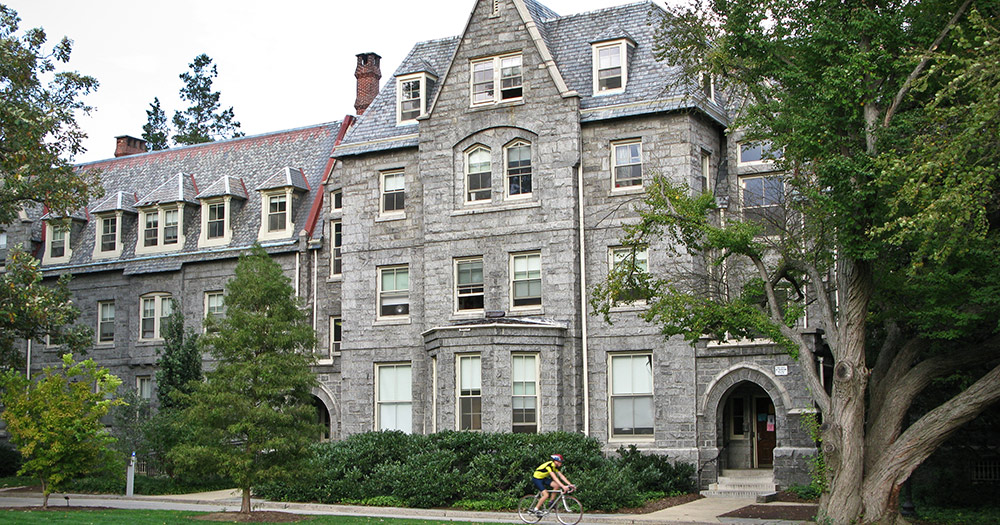By Adrian Velonis, Staff Editor
Haverford’s info pamphlets pride themselves on the college’s welcoming treatment of incoming students on its 24 first-year halls. Instead of following a traditional RA system, a group of 12–22 first-years live on-hall with four upperclassmen: two Customs People (CPs), who set a tone on the hall and help with any social issues that arise, an Upperclassmen Advisor (UCA), who helps the frosh adjust to the college’s academic environment, and a friend of the UCA’s without official responsibilities.
First-years also have access to an Honor Council Orienteer (HCO), a Peer Awareness Facilitator (PAF), and an Ambassador of Multicultural Affairs (AMA), each of whom live off the hall but run information-focused “hall sessions” throughout the year. All-in-all, that’s six full-fledged Customs members per hall, for a total of 144 members.
In a joint response from Customs Co-Heads Joseph Spir (‘20) and Nichole Almanzar (‘20), “What makes Customs such a strong program is the involvement of such a big part of the community. About 10% of students participate as Customs folk every year. This supplements the agency that they get in building their own First Year halls—from themes, to sessions, to bonding experiences and activities.” However, this year’s recruiting process for the Customs program has proven troublesome in multiple ways, threatening to upend the support structure that it is supposed to provide.
Applications for these positions come from students seeking to facilitate a smooth transition between high school and college for first-years—or to avoid the perils of the housing lottery. This is not a paid role, a fact which has led to contention among the student body.
Early in the spring semester, the Haverford Student Workers Organizing Labor (SWOL) started a Customs boycott, demanding fair compensation for their time. SWOL pushed for a yearly stipend of $9,428 for on-hall Customs participants and $3,930 for off-hall members, an estimated $1 million annually to cover the entire program. This is up significantly from the current budget of approximately $125,000 per year, most of which covers meals.
Students from low-income backgrounds are disproportionately affected by their status as volunteers in Customs. Campus wages have remained stagnant for several years, a point of contention among the student population, and many students work multiple jobs to support themselves financially. It’s often hard for students to justify spending more time doing activities and bonding with first-years—critical aspects of the program—when they could be earning actual compensation elsewhere.
Spir and Almanzar noted that the movement to pay Customs members “definitely delayed our recruitment process, which made us cut down the number of trainings that we would have during the Spring semester. […] We are definitely still looking for and constructing a solution that amends such concerns while still keeping the spirit and purpose of Customs present.”
On March 4th, college administrators held a “town hall” meeting with students supporting the boycott to discuss solutions. They repeatedly emphasized the issue of limited funding, stating that it would be impractical to pay all Customs members without reverting to an RA system with only one upperclassman per first-year hall. However, they did express some openness to the will of the student body. As Dean Michael Elias pointed out, “I think the ideal outcome of this is tangible steps forward so it isn’t just a one-off town hall. We don’t disagree that students shouldn’t be paid, it’s just a matter of how.”
The crop of Customs leaders for the 2019–2020 academic year don’t have it easy. The program has always had difficulty attracting upperclassmen for the role of UCA, but this year, the number of applications was so low that the program’s leaders have allowed eight UCAs—traditionally an on-hall position—to live in upperclassmen dorms instead. Although they still aim to be involved with their respective halls, having the UCA living in another building inevitably changes the social dynamic. CPs are typically sophomores, and without the presence of a third on-hall team member, the amount of pressure on the CPs to maintain a supportive atmosphere for their first-years increases substantially.
The Customs Committee also had to brainstorm a solution to the limited number of CP applications they received. In Barclay Hall, which has two Customs teams per floor (north and south), the entire first floor has been combined into a single hall fittingly dubbed “megahall” by its to-be CPs, Rafael Jovel (‘22) and Ellie Canty (‘22). “I anticipate challenges in uniting a large diverse group of people,” said Canty, “especially because there is also going to be a physical divide between north and south halls.”
The number of first-years on megahall, an expected 24–28, won’t necessarily be unmanageable—apartments hold up to about 22 first-years—but its design is not as unified as a typical hall up-campus, and the size could pose a challenge with fostering a closely-knit group dynamic. Megahall will be getting two UCAs to accommodate the situation. According to Jovel, “We’ve got an amazing off-hall team that I’m very much looking forward to working with, and hopefully they will help alleviate some of the pressure in regards to closeness to our frosh.”
Customs teams will arrive back on campus in late August to decorate their halls and attend additional training sessions prior to the arrival of the incoming class for Customs Week.
Image credit: Haverford College
